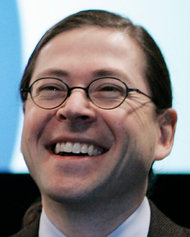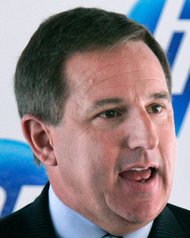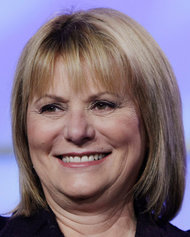Imagine having to run on this track record:
¶ After ousting Mark Hurd as chief executive in 2010 amid messy allegations of sexual harassment, the board hired Léo Apotheker to replace him, even though Mr. Apotheker had been fired as chief executive of the European software giant SAP after just seven rocky months. Most of the board didn’t bother to meet Mr. Apotheker, let alone ask him any probing questions about his tenure at SAP, before rubber-stamping the choice of the board’s four-member search committee.
¶ In 2011, H.P.’s directors unanimously approved the acquisition of the British software maker Autonomy for $11.1 billion, a deal that was considered wildly overpriced even at the time. Less than a year later, H.P. wrote off $8.8 billion of that and claimed it had been defrauded. (Autonomy officials have denied the allegations, which are being investigated by authorities in both the United States and Britain.) Some consider Autonomy to be the worst corporate acquisition in business history. In fiscal year 2012, H.P. wrote off a total of $18 billion related to failed acquisitions and other missteps.
¶ With Mr. Apotheker at the helm and the board backing his strategic initiatives, H.P. announced that it was considering abandoning its giant personal computer business, then changed its mind. After Mr. Apotheker had been on the job a disastrous 11 months, the board demanded his resignation, and then paid him more than $13 million in termination benefits.
Shareholders might have forgiven what Fortune magazine called a “tawdry reality show” if the stock had performed well. But from the time Mr. Apotheker was hired in September 2010 until he left in 2011, the stock went from more than $45 a share to a little more than $22. Despite a recent rally, shares are still below $24, even as the Dow Jones and Standard Poor’s 500-stock indexes are hitting new highs.
“You really couldn’t have a stronger case for removing directors,” Michael Garland, executive director for corporate governance in the New York City comptroller’s office, told me this week. “There’s been a long series of boardroom failures that have harmed the reputation of the company and repeatedly destroyed shareholder value over an extended period of time.”
Yet all 11 H.P. directors were re-elected on March 20.
H.P. is hardly an isolated case. According to Patrick McGurn, special counsel for one of the major shareholder advisory services, Institutional Shareholder Services, shareholder efforts to remove directors in uncontested elections rarely succeed or come close, even in egregious circumstances. Last year, there were elections for 17,081 director nominees at United States corporations, according to the service. Only 61 of those nominees, or 0.36 percent, failed to get majority support. More than 86 percent of directors received 90 percent or more of the votes. Of the 61 directors who failed to get majority approval, only six actually stepped down or were asked to resign. Fifty-one are still in place, as of the most recent proxy filings.
“People are calling them zombie directors,” Mr. McGurn said. But that hasn’t stopped them from serving on boards for what is typically lucrative compensation for relatively little work. (H.P.’s directors received a mix of cash and stock payments ranging from $292,000 to $380,000 in 2012.
While the H.P. board has been largely reconstituted since the debacle of Mr. Apotheker’s appointment, all but one (Ralph Whitworth, a well-known value investor who joined in November 2011) approved the disastrous Autonomy deal. Raymond Lane, seen as an ally and supporter, at least initially, of Mr. Apotheker, was named chairman at the same time Mr. Apotheker took the helm. Working closely with Mr. Apotheker, Mr. Lane proposed five new directors. John Hammergren, chief executive of the McKesson Corporation, has been on the board for eight years, and G. Kennedy Thompson, chief executive of Wachovia before it was forced into a merger with Wells Fargo during the financial crisis, has been a board member for seven years. Mr. Hammergren was on the search committee that recommended Mr. Apotheker’s appointment.
In its proxy materials, H.P. didn’t address the company’s record under these directors, but nonetheless recommended that shareholders vote for the entire slate, citing the risk of “destabilizing” the company by changing directors in an “abrupt and disorderly manner.” As to Mr. Lane, Mr. Hammergren and Mr. Thompson, it repeatedly cited their “experience” in running global companies, but said nothing about their roles in selecting Mr. Apotheker or other directors, the Autonomy acquisition, other failed strategic initiatives or, indeed, anything at all about their tenures at H.P.
This article has been revised to reflect the following correction:
Correction: March 29, 2013
An earlier version of this article used outdated figures for the board’s compensation in 2012. The directors received a mix of cash and stock payments ranging from $292,000 to $380,000 in 2012, not $290,000 to $355,000, which was the payment range for 2011. The earlier version also misstated the compensation of Mr. Lane, the board chairman, for 2012. He received neither a cash award nor equities in 2012, though he received two large equity awards in 2011.
Article source: http://www.nytimes.com/2013/03/30/business/why-bad-directors-arent-thrown-out.html?partner=rss&emc=rss



